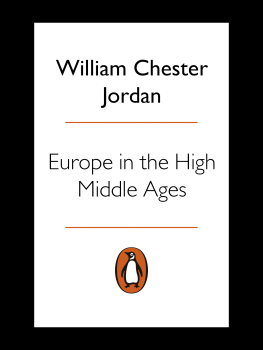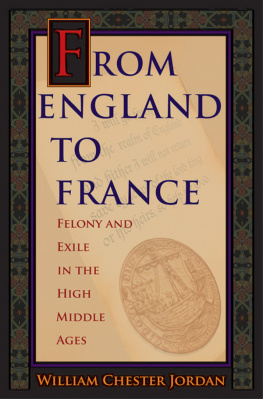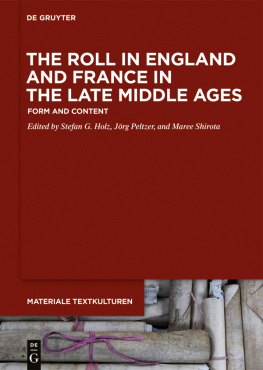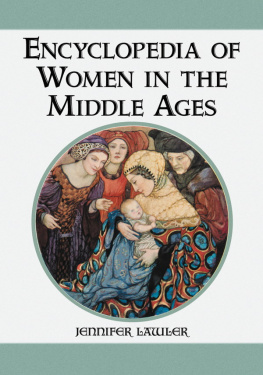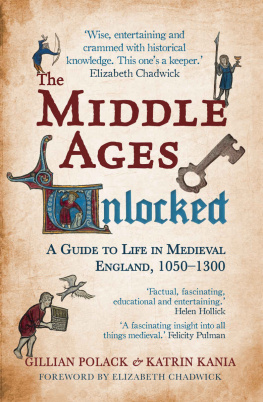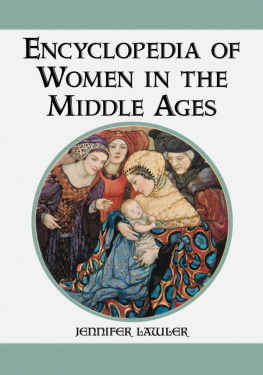From England to France
FELONY AND EXILE
IN THE HIGH MIDDLE AGES
William Chester Jordan
PRINCETON UNIVERSITY PRESS
Princeton and Oxford
Copyright 2015 by Princeton University Press
Published by Princeton University Press, 41 William Street,
Princeton, New Jersey 08540
In the United Kingdom: Princeton University Press, 6 Oxford Street,
Woodstock, Oxfordshire OX20 1TW
press.princeton.edu
Jacket border daniana/Shutterstock.
All Rights Reserved
Library of Congress Cataloging-in-Publication Data is available
ISBN 9780-691164953
British Library Cataloging-in-Publication Data is available
This book has been composed in SabonLT
Printed on acid-free paper.
Printed in the United States of America
10 9 8 7 6 5 4 3 2 1
To
Christine Kenyon Jordan
Contents
Acknowledgments
I wish to thank Martha Carlin, who over a casual lunch at the British Library directed me to an enlightening source on fourteenth-century travel from Dover of which I was unaware. I also wish to express my gratitude to Margaret McGlynn, Shannon McSheffrey, and Karl Shoemaker for making some of their unpublished work on sanctuary available to me. When I was unsure what secondary source to trust on the level of destruction inflicted on manuscript collections in the Pas-de-Calais during the Second World War, I consulted Dr. (and Col.) Paul Miles, whom I wish gratefully to acknowledge. Several of my graduate students, in particular Hagar Barak and Jenna Phillips, listened patiently and graciously to the anecdotes I retold from the felony cases I was reading. Moreover, I shared portions of the manuscript with them at various times for feedback and have shamelessly plagiarized their suggested rephrasings as a testimony of my debt to them. I need also to express my thanks to the members of the Department of History and other friends and colleagues at Princeton who attended my Work-in-Progress report on this project (sponsored by the Shelby Cullom Davis Center) and to the hosts, Professors Scott Bruce and Anne Lester, and audience for a similar presentation, the inaugural James Field Willard Lecture in Medieval History at the University of Colorado, Boulder.
After I had completed a working draft of the book and submitted the manuscript to Princeton University Press, I had the good fortune that my editor, Brigitta van Rheinberg, chose Professor Nicholas Vincent of the University of East Anglia as a referee. His was one of the most thorough and helpful readings any author could possibly receive. My gratitude is immeasurable. My gratitude to my copyeditor and indexer, Katherine Harper, must also be publicly avowed. Last but by no means least I want to mention once again Brigitta van Rheinberg. Her official title at Princeton University Press is Assistant Director and Editor in Chief. It was to her that I first described this project and kept describing it at different stages over a number of lunches. She always seemed fascinated by it, an impression that was very reassuring. One of the earlier of these lunches, however, was memorable for a wholly different reason. It was accompanied by what turned out to be a ghastly Creamsicle martini, which I ordered, recollecting how much I had delighted in Creamsicles as a child. Brigitta was doubtful from the first, and rightly so. For those who want to give it a try, howeverand I have in mind principally two Princeton colleagues, Professors Haldon and Reimitza recipe can be found (at least at the time of this writing) at http://cocktails.about.com/od/vodkadrinkrecipes/r/creamsicle.htm. My version was prepared not with vodka but with the distilled spirits of the juniper berry and served in a traditional martini glass, not the Collins glass recommended on the website. I hasten to say that I disclaim all liability for consumption.
From England to France
Introduction
MANY DESIRES AND OBLIGATIONS motivated people living in England to travel to France in the period 1180 to the mid-fourteenth century, a span of years that I shall sometimes call, for varietys sake and as others have, the long thirteenth century.
France also drew people from England in the long thirteenth century for study at the University of Paris, the University of Orlans, and the University of Toulouse and for businessinternational merchants, government ambassadors and messengers, and clerical dignitaries attending ecclesiastical meetings, such as the Cistercian Orders General Chapters, the annual gatherings of its abbots.
At the highest social levels there was no language problem or but a minor one. Of course, many smaller enterprises, in addition to these Italian super companies, to use Edwin Hunt and James Murrays language, would have had knowledge of and exploited similar, if less extensive, cross-Channel networks.
Finally, wherever they may have been born, high churchmen occupying English offices had the advantage of being able to communicate with more or less ease in Latin with their French counterparts, as well as with clerical visitors from beyond the continental borders of France whom they encountered at general chapter meetings and synods. His doubt is evident from his very choice of words, but even modest achievement in spoken Latin was helpful in educational and clerical circles.
There were four principal categories of less desirable English sojourners in Franceless desirable to different degreesin our period. One constituted the men and women who are at the center of the present study: namely, those sent into exile because of their alleged association with serious criminal activities in England. The other three categories, about which a few words need to be said, were political exiles, demobilized troops, and, as the English regarded them, pariah groups.
Political exiles, typically prelates and nobles, could count on finding temporary shelter with French kinfolk or among French friends and colleagues during periods of personal danger in England, such as the Interdict of 120812 and the Baronial Revolt and its immediate
Unemployed troops were less of a presence and therefore less of a problem in the thirteenth century than before or after, because there was a long period of peace between the two kingdoms. This lasted de facto from 1206 until 1259, with two brief interruptions (1214 and a few years after, and 1242), and de jure with no interruptions thereafter until 1294. although as we shall see this was not an unmixed blessing for them.
The case of the last category of sojourners, pariah groups, makes this abundantly clear, for Italian bankers in England, such as the Riccardi, were a periodically reviled group. It is true that they played useful and visible roles in certain aspects of royal finance, but this very fact laid them open to blame in even brief periods of fiscal stress. In 1312, King Edward II turned on them, confiscated their wealth, and sent them into exile. They found shelter with the men who ran branches of their banks on the continent, but the latter sometimes also suffered resentment because of their wealth and their association in France with the collection of taxes, making the exiles sojourn with them all the more worrisome. The woes suffered by the Riccardi have been movingly retold by Richard Kaeuper.
Such, then, is an abbreviated taxonomy of groups of people from England who found themselves sojourning in France at different times in the long thirteenth century. Among them were those who voluntarily chose to spend time on the continent. Others were compelled to emigrate. They included native Englishmen and women as well as people whom natives regarded as aliens. In terms of resources their wealth varied from the riches of a great baron like Earl Richard of Cornwall to the almost minimal possessions of common pilgrims. Some of these sojourners were genuine visitors who stayed for only brief intervals in France before returning to England. Others, like the political exiles, existed in a kind of limbo, not knowing when they might be able to return. Still others (I have the Jews in mind) were commanded by the English crown never to set foot in England again.


